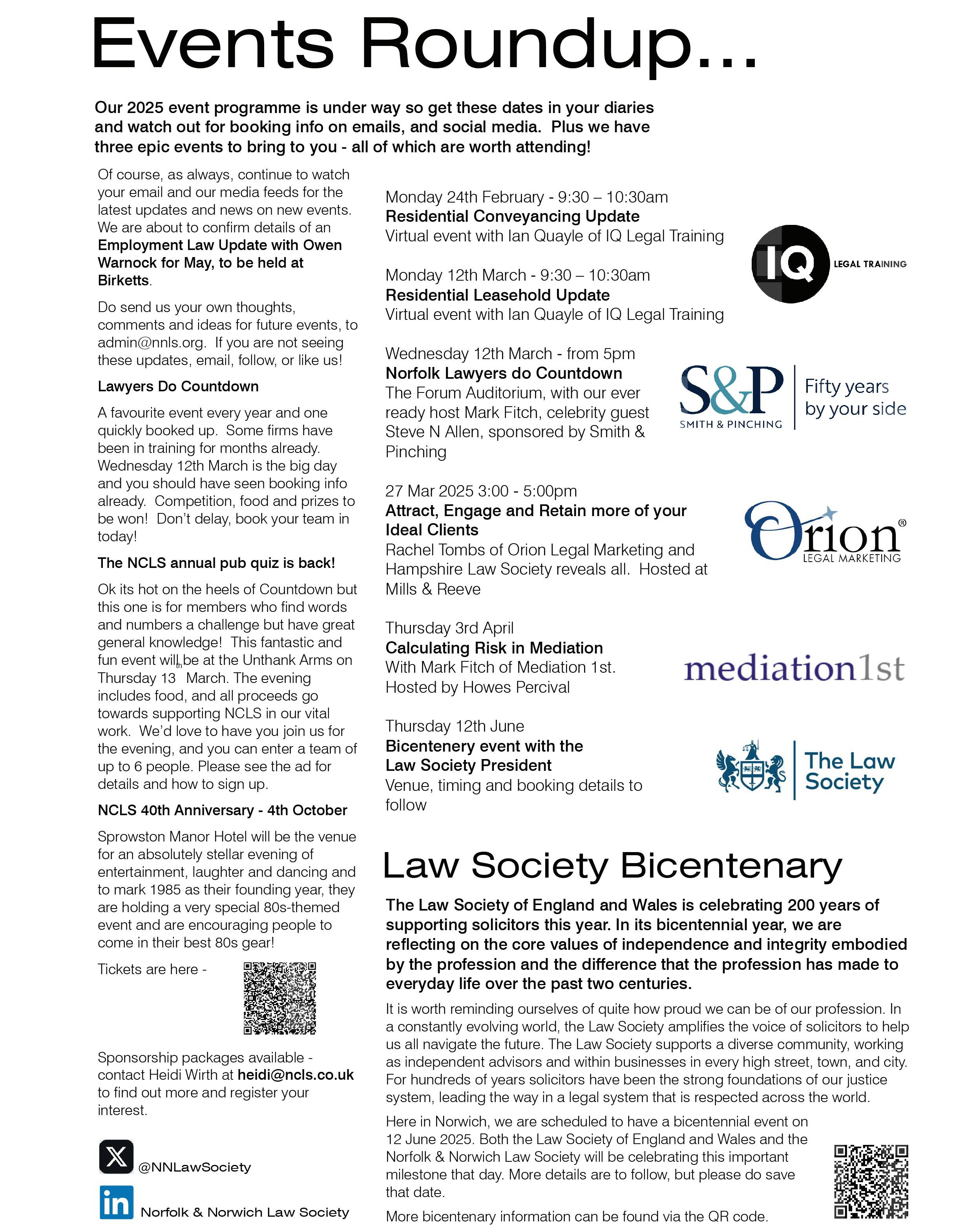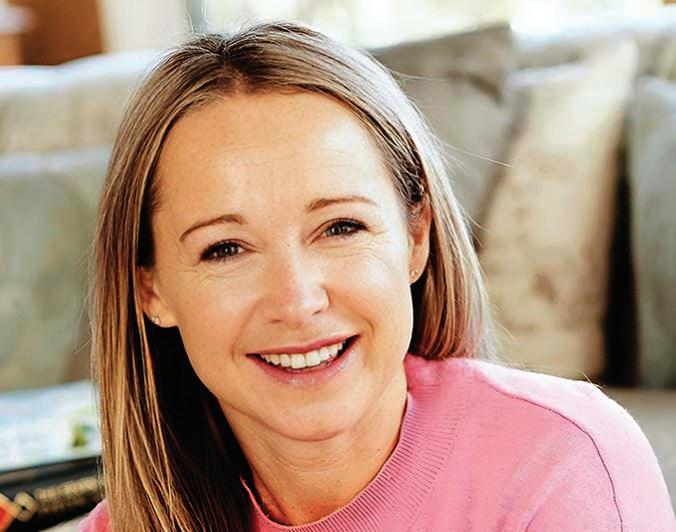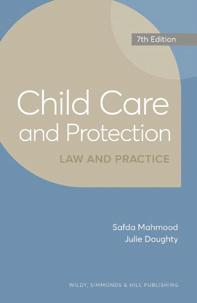




Magazine of the Norfolk & Norwich Law Society - www.nnls.org - Winter 2025
Norfolk Community Law Service was proud to welcome the Baroness, the very public face of Britain’s civil liberties movement, to its Annual Lecture and NNLS members were only too happy to attend - pictures inside. Magazine of the Norfolk & Norwich Law Society - www.nnls.org - Winter 2025

Welcome to our first edition of 2025 and we kick off with coverage of Norfolk Community Law Services’ epic Annual Lecture with Baroness Shami Chakrabarti and coverage of our joint event with the Junior Lawyers Division in December. Also inside latest details on The Solicitor’s Charity, and as always, events coming up, including Countdown and the NCLS Quiz.



It is a real privilege to be introducing myself as your latest President of the Norfolk & Norwich Law Society
I am very fortunate to be succeeding Shelyna Mariscal who presided over a fabulous year for NNLS and I am grateful for her ongoing support as Immediate Past President. I am also glad to be ably assisted by my Vice President, Milan Pandit at Leathes Prior.
I can assure all members that what Milan and I may lack in terms of experience as lawyers, will be more than made up for by what we can offer by way of enthusiasm and commitment to the NNLS cause. That commitment is two-fold: firstly, to ensure that NNLS does all it can to lobby on behalf of our members and the incredible local legal profession and to offer all the support and education that we can. Secondly, to ensure that we have a lot of fun along the way. I refuse to accept that being a lawyer deprives us of the right to enjoy both our profession and our colleagues.
We may well be in competition with one another at times for clients or work, but in reality, we all thrive best when we come together as a profession and a local legal community and ensure we stand up collectively against the nefarious forces that seek to undermine what our profession offers to those who need our services.
Whilst I may not be from Norfolk, I have fallen in love with the county and the legal community here ‒ and I am proud that in electing me to represent you this year, the NNLS has shown itself to be diverse, modern and dare I say, brave? Who would have thought a family lawyer from Manchester might receive this honour? I look forward to representing you, and if any members of the profession wish to reach out to me privately to suggest ways in which you think the NNLS could better serve your needs, do not hesitate to be in touch.
Best wishes.
Kerry Read President, Norfolk & Norwich Law Society 2025-26
















Estatesure is a part of the Estatesearch Group, a trusted legal technology partner for private client professionals.
Steele, Founder, Searching for Serenity
Jordan adds: ““I’ve known the team at Estatesearch for several years as we also use their asset and liability searches. I know that if I have a query, or if a client has a question, then it’s easy to email the Estatesearch team and receive a swift response.
Emma Baddaley continues: “I look forward to hosting these sessions on behalf of Estatesearch as we underline our commitment to supporting clients and the wider private client community through these continuing competence and knowledge sessions.”
For further information and to register please see: https:// www.estatesearch.co.uk/webinars/
“Using Estatesure’s unoccupied property insurance is cost-effective and convenient. It means we can provide a better, more comprehensive service for our clients and they know that everything is taken care of, which is always appreciated at an emotional time in their lives when they have lost a loved one.”
For further information about Fosters Solicitors please see: https://fosters-solicitors.co.uk/
Jordan Rodwell, Solicitor in the Wills, Trusts & Probate Department at Fosters Solicitors in Norwich has used Estatesure’s unoccupied property insurance since its launch in 2024
Legal technology group Estatesearch has launched Open for Business – a new, free live webinar series to support legal firms elevate their businesses and win more clients. The monthly webinars will be delivered by industry experts and cover a range of pressing topics including compliance, working with vulnerable clients, technology, accounting, marketing and managing stress in the workplace.
Jordan Rodwell explains: “Previously on estate administration matters, we would have to contact several different insurance providers to obtain quotes to cover property no longer occupied by the deceased. This was a time-consuming task and therefore a hefty cost to the estate; it often took hours to obtain quotes and present these to the executors.
For further information about Estatesure’s range of services please see: https://www.estatesure.co.uk/ or email helpdesk@estatesure.co.uk
“Now we are using Estatesure’s insurance, it takes minutes to set up and send the information to our clients. We only need to provide minimal details about the property and with a couple of clicks we have the quote we need.
Emma Baddaley, Strategic Relationship Director at Estatesearch explains: “Estatesearch’s goal is to help private client professionals manage their operations with greater efficiency and through risk mitigation. Our new webinar series is designed to support these aims by exploring several key areas of a business where law firms can add value to their clients and their business. With this in mind, we have invited six industry professionals, each an expert in their own area, to present on these important topics to provide insight and help legal teams overcome common problems.”
The monthly webinar series which commences on 27 February 2025 will include the following sessions:
• Soft Skills and Working with Vulnerable Clients delivered by Michael Culver, Managing Director, Culver Law
• Regulation and Compliance in Private Client delivered by Paul Saunders, Managing Director, Legal Eye
• Technology and Efficiency in Estate Accounts delivered by Aleks Tomczyk, Founder and Managing Director, Exizent
• Accounting for Law Firms, Alex Holt, Chief Revenue Officer, Cashroom
“Speed is not the only benefit of Estatesure’s unoccupied property insurance. Imagine I’m dealing with 20 estate administration cases and each property needs a regular, weekly inspection. Potentially, this could take up several days of my time, and the associated cost for estate would be significant. The properties are not always local to us, and if the deceased’s family are unable to check the properties themselves, this makes regular inspection even more challenging. Estatesure’s unoccupied property insurance removes the need for regular inspections which is a huge benefit for the estate and removes any pressure from the family of the deceased.
• Top Tips for Marketing Your Law Firm, Tom Stansfield, Founder, Legal Growth
• Managing Stress in the Workplace for Law Firms, Leah
“Our clients also like the fact that a refund is offered on premiums should the property be sold. This can make a huge financial difference.


Poppy’s

New committee aims to empower advisers to accelerate growth of high value legacies
When Poppy’s Dog Guardian conta
Remember A Charity, the consortium of UK charities working to grow the legacy giving market, today announces it has set up a committee of wealth advisers to build expertise within the advisory profession and to champion and promote legacy giving amongst high-net-worth clients. The Private Client Advisory Committee for Legacy Giving is working to guide the consortium’s work programme with wealth advisers, which aims to equip wealth advisers with the knowledge and resources they need to inspire and support high net worth clients in achieving their philanthropic goals, growing high value legacy giving.
The creation of the committee follows the consortium’s exploratory research into the role of wealth advisers in growing legacy giving, published earlier this year. This revealed that appetite for supporting clients in achieving their charitable legacy was high, but that relatively few advisers outside the Will-writing sphere regularly advised clients on the topic. The research report was accompanied by a suite of web-based resources for advisers, including a business case for discussing charitable legacies with clients and case studies showing the different ways a charitable legacy can be structured.
Remember A Charity’s wealth adviser programme builds on the consortium’s experience of working with solicitors and Will-writers in having established a network of 900 solicitor firms and Will-writers (Campaign Supporters) who have all committed to make their clients aware of the option of including a charity in their Will, normalising legacy giving.
The Private Client Advisory Committee for Legacy Giving brings together
influential wealth advisers to accelerate learning, developing the knowledge and skills needed for advisers to initiate values-led discussions with their clients about charitable legacies. Committee members have committed not only to share knowledge and expertise, but to advocate for legacy giving with their clients, within their organisations and across their wider peer groups and networks. This includes:
Raising the topic of legacy giving with their clients and supporting those who wish to fulfil their charitable legacy
Educating and informing colleagues, championing legacies across their firm Advocating for legacies — inspiring their wider network to discuss charitable legacies with clientsReporting learnings back to the committee, accelerating learning and helping to shape Remember A Charity’s future development of best practice guidance and resources for advisers

Committee Chair and Private Wealth Partner at Boodle Hatfield, Clare Stirzaker , says:
“Helping private clients consider and implement their charitable legacy is a privilege for any adviser and definitely the part of my job that I enjoy the most. The aim of this committee is to address how we can better enable our colleagues and peers to raise and discuss this important topic with clients. I very much hope that our efforts and collaboration drive changes across the wealth management industry, supporting higher levels of legacy giving whilst also unlocking potential lifetime giving too.”

Director of Remember A Charity, Lucinda Frostick, adds:
“Private client advisers are pivotal when it comes to supporting clients with their philanthropic and financial decisionmaking. Yet, when it comes to engaging with high net worth individuals about legacy giving, these conversations can be few and far between, and there is opportunity for greater depth. Such discussions can be crucial in supporting clients achieve their philanthropic legacy.
“Our mission with this work programme is to deepen our understanding of the ways in which wealth advisers can support clients with charitable legacies, and to empower and equip this growing community of influential advisers to unlock and inspire legacy growth across their client base.”
Driving Best Practice in legacy giving
The committee will shape Remember A Charity’s work programme with wealth advisers. This includes developing training, mentoring and best practice guidance. By nurturing a network of legacy advocates in the wealth adviser community, Remember A Charity aims to accelerate the growth of high value legacies and inspire a longerterm cultural shift where advisers more regularly inspire legacy consideration.
The committee first met in person in September, agreeing the terms of reference and exploring the key areas of activity to be progressed within the group. They will continue to meet on a quarterly basis for a 12-month period before reviewing next steps.
Find out more about Remember A Charity’s work to grow legacy giving at rememberacharity.org.uk


Poppy’s
When Poppy’s Dog Guardian conta
Legacy Futures has published findings from its most recent Legacy Monitor, the legacy giving consultancy’s quarterly research programme. The Legacy Monitor compiles data from a consortium of 81 of the UK’s leading charities, representing almost half of the charity legacy market, to analyse the current state of the legacy market.
• Legacy income reported by consortium members in the latest year to June 2024 was up +1% on the previous year.
• Income growth has been driven by an increase in the number of bequests (gifts in wills), up 7% since last year, reaching 62,100 bequests.
• The growth in bequests is primarily a result of continuing improvements in the probate process at HM Courts and Tribunals Service, which is continuing to process more grants than applications, reducing the
backlog of cases.
• Average gift values for residual gifts have fallen slightly by 2.5% to £64,400 due to the cooling housing market.
• Pecuniary (fixed monetary) gift values continue to remain static as they have done for the past year.
The legacy performance data was compiled using responses provided by the Legacy Monitor’s consortium members, together with wider economic research.
Ashley Rowthorn, CEO of Legacy Futures, said: “Looking ahead, the increase in bequests from probate and a more optimistic outlook on house prices lead us to expect the legacy market to remain resilient, with modest growth through the rest of 2024.
“This is encouraging news for the charity

sector, which has faced significant challenges in recent years due to the cost-of-living crisis and delays in probate. The stability we’re seeing in the legacy giving forecast enables charities to plan more confidently for the future, making decisions and laying out strategies with a degree of insight into how legacies are predicted to perform.”


Poppy’s
When Poppy’s Dog Guardian conta
SSAFA, the Armed Forces charity exists so that no one in our Armed Forces is left to battle life’s darkest problems on their own. Together, with the help of our volunteers and supporters, we are close at hand for any member of our Armed Forces family in their time of need. We provide welfare and wellbeing support to serving personnel, veterans, and their families across the UK and abroad. All tailored to individual needs, helping people get their lives back on track. We do not judge – we offer a helping hand and a listening ear, for as long as we are needed.
SSAFA relies on the generosity of our supporters to provide our vital services. With a gift in your Will, you could help us be there for future generations of the Armed Forces family.
Gary is a veteran of the Scots Guards. He is also a triple amputee.
His life – and his family’s – changed forever when he lost three limbs in a devastating explosion while serving in Afghanistan. The years in between and the road to recovery have been long and challenging, but SSAFA was there for him and his family.
From adapting their family home to accommodate Gary’s needs, to providing logistical and financial support during many medical operations, SSAFA has been there whenever and however he and his family needed us.
Not everyone that SSAFA supports has the challenges Gary lives with, and we do not know how our Armed Forces will be needed in the years ahead. But one thing we do know. With a gift in your Will, you will help us be there for our Armed Forces family in the future, providing welfare and wellbeing


support to those who need us. So that they never battle alone.
Last year, due to the kind generosity of supporter donations, including those who left a legacy to SSAFA with a gift in their Will, the charity was able to support an incredible 54,000 people from the Armed Forces community. Each person helped had their own unique challenges and battles.
You can help us face the uncertainty in the years ahead with confidence and change so many lives. By leaving a gift in your Will to SSAFA, your kindness can ensure that they never battle alone.
With a gift in your Will, you will stand alongside our future Armed Forces, always and forever.
To find out more, visit ssafa.org.uk/ gifts-in-wills.






Child Care And Protection Law and Practice
7th Edition
By Safda Mahmood and Julie Doughty
ISBN 978 0 85490 306 1
WILDY, SIMMONDS & HILL PUBLISHING www.wildy.com
AN EXTENSIVELY UPDATED GUIDE TO THE COMPLEXITIES OF THE CHILDREN ACT BY MAHMOOD & DOUGHTY
The seventh edition of this important book from Wildy, Simmonds and Hill Publishing has been written and edited by Safda Mahmood and Julie Doughty. The work extensively updates the practical guidance it offers on the complexities of the Children Act 1989 and subsequent child protection legislation, guidance and case law.
Among the developments included in this edition are the changes brought about by the Public Law Outline in January 2023 to family justice, particularly in relation to expert evidence, time limits, care plans and delay. What we found particularly helpful was the advice during a period of change within child law litigation.
The authors give us a most useful commentary on the law surrounding deprivation of liberty (DoLs) with regard to children, exploring and explaining the interface between what always difficult care proceedings and Article 5 ECHR, and a consideration of pivotal case law, like the decision in Re T (A Child) [2021] UKSC 35.
For those readers who are in practice in family law as counsel or solicitors, there is a revision of leading Practice Directions, specifically PD12A (Care and Supervision Proceedings and other Part 4 Proceedings: Guide to Case Management), Child Arrangements Programme (PD 12(B), and Revised PD12J – Domestic Abuse and Child Arrangements, Pilot Reporting and Private Law Review. We would add that it is always useful to keep as well informed as possible with such changes at a time when procedure rules are being regularly reviewed.
We believe that the contents of the new edition will be of great use and support to students, graduates and those more recently qualified practitioners because the authors have included significant case law developments in children law since the publication of the last
edition. But do please remember that the case law itself can more of a guide on outcomes as every case is different in family proceedings.
Finally, there is a most important and excellent explanation of the revised edition of “Working Together to Safeguard Children” (2023), which has changed the position in relation to safeguarding and child death reviews, as well as assessments.
All these excellent publications from Wildy, Simmonds and Hill remain a practitioner’s friend during these times of increasing changes and revision in child law proceedings, plus the ever re-modelling of our process as more and more legislation and guidance is produced. Keep up to date!
The date of publication of the paperback seventh edition is cited as June 2024.

Global Investment Funds A Practical Guide to Structuring, Raising and Managing Funds
Second Edition
Consulting Editor: Tom Alabaster
ISBN 978 1 83723 012 9
GLOBE LAW AND BUSINESS
www.globelawandbusiness.com
EXPLAINING THE POPULARITY OF GLOBAL INVESTMENT FUNDS IN 2020s TO THE PROFESSIONALS
Globe Law and Business always excel when offering advice to lawyers in business. And never more so than with private investment funds when Tom Alabaster, the consulting editor, has some involvement! What the publishers offer us here is a practical guide to the structuring, raising and managing of funds which will be of interest and help to a wide readership.
Such funds are investing more capital than ever before, and the funds themselves are becoming larger than ever. And, of course, the industry’s success comes against a backdrop of evolving market trends, increasing regulatory and tax compliance and the rise of ESG, mixed at a time with a new, incoming Labour government which has a (possibly) rather different approach to fiscal matters generally (at least as far
as some practitioners are concerned) for the rest of this decade.
In relation to structuring, fundraising, making deals, managing exits, maintaining investor relations and dealing with the press, investors and their advisers are faced with unprecedented challenges and opportunities so this new edition for 2024 comes in very handy.
Globe Law gives us, as practitioners and counsel, an excellent and practical new second edition of “Global Investment Funds”, edited by Tom Alabaster at Ropes & Gray. This hardback book is a mini classic which offers us contributions from leading industry specialists covering a wide range of issues arising at all the stages of a private investment fund‘s life cycle.
The new edition also offers the following topics which include formation and structuring, regulatory matters, deal-level considerations, environmental concerns, as well as covering jurisdictional/offshore matters, their jurisdictional differences and choice drivers (such as Ireland and Luxembourg). We found it to be a most successful and pragmatic guide which clearly paves the way for fuller explorations of the particular issues presented with regard to listed funds, energy funds, secondary transactions and GP-led recapitalisations.
Globe Law and Business have always provided lawyers in business with titles covering a wide range of specialisms to fit their needs and requirements. Here we have a practical guide to the legal, regulatory, tax and commercial elements of establishing and operating private investment funds.
And it remains our view that we consider that practitioners, advisers and other industry participants will almost certainly gain a significant benefit from applying its contents within their own businesses. Your business cannot really afford not to have a copy in the office library… and yes, we still do have legal and business libraries even in the digital 21st century!
The date of publication of the hardback second edition is cited as April 2024.
Appreciations by Elizabeth Robson Taylor MA of Richmond Green Chambers and Phillip Taylor MBE, Head of Chambers, Reviews Editor, “The Barrister”, and Mediator

At FHM Forensic Accounting we are engaged to value businesses of all shapes and sizes. Formal business valuation reports may be required in financial disputes and matrimonial matters. They are also obtained by business owners to assist in strategic and succession planning and for tax planning. Typically we undertake 50 to 60 business valuations each year and in addition are instructed to critique valuations prepared by accountants and other experts.
In this article we seek to debunk common myths about business valuation and to share insight on the key drivers of business value.
Myth 1: Businesses are worth a multiple of profit
There are a number of reasons why a business cannot be valued simply by applying a multiple to the profit including:
• Two businesses generating the same profits may have very different asset bases eg cash reserves, property ownership, debt etc
• Two businesses may be reporting the same profits but have very different prospects for future trading
• Reported profit can be manipulated and before applying a multiple the valuer must assess the appropriate measurement of profit
• Businesses may report losses and yet still have a value
• The buyer of a business is not paying for historical profits, they are motivated by their assessment of future cash flows
Myth 2: Business value is determined by revenue
A common myth amongst entrepreneurs is that a business’s value is determined by applying a multiple to revenue. Revenue is a factor but two businesses generating the same turnover may have very different values. Valuation considers the profit generated from turnover, the cashflows, sustainability of the trading performance and the potential for future growth.
There are certain businesses such as accountancy practices, law firms and opticians where a multiple of turnover may be a starting point in a valuation by a consolidator who is looking to bolton revenue.
Myth 3:Business buyers pay for great potential
Business owners can make wild claims about the great potential of their business. Unfortunately business buyers are highly sceptical about such claims. The obvious next questions is why the seller is not exploiting that potential themselves. Business potential is relevant in marketing your business but it is unlikely to result in a premium price.
Myth 4:There is a fixed figure for the value of a business
Business owners often expect the business value to be a concrete figure. In reality valuation is subjective and dynamic. The valuer will set out the purpose of their valuation, the methodology and the assumptions they have used. The value given is a snapshot at a point in time. Regular updates to business valuations are needed whether the valuation is for litigation or commercial planning.
Myth 5:Valuation is just about the numbers
Whilst robust financial analysis is key to the valuation process, we also consider qualitative matters such as intellectual property, the management team, customer loyalty and business pipeline.
Myth 6:Start-ups can’t be valued
Valuing start-up businesses is complex and particularly subjective but there are a number of appropriate methodologies that be adopted. When valuing businesses such as start-ups it may be appropriate to adopt more than one methodology.
Myth 7: A company with no assets has no value
A company with minimal net assets (or even net liabilities) on the balance sheet may indicate minimal market value. However there are also situations where companies with minimal net assets have substantial value. It is possible a business is generating significant profits for the business owners but these are extracted each year so the retained reserves are minimal. The valuation will be based on the expected future maintainable profits for the owners.
Myth 8: A 25% shareholding is worth 25% of the value of the whole business
In terms of business valuation, a quarter of the cake is not necessarily worth a quarter of the whole cake.
The concept of the minority discount comes up regularly in the valuation of private companies including in divorce cases and shareholder disputes. When valuing shareholdings of less than 50%, the application of a minority discount can have a very significant impact on the valuation.
For example, say the valuation of the mythical company Fruit Cake Ltd is £10
million. Mr Raisin, a shareholder, has a 25% shareholding and so it might be assumed that his 25% shareholding is worth £2.5 million. However, if a minority discount is applied - and adopting the figures in the ACCA Technical Guidance 167 - a discount of 45% to 55% may be applied. For example, using a 50% discount reduces the value of Mr Raisin’s shareholding from £2.5 million to £1.25 million. A minority discount reflects the probable reduction in the value of a minority shareholding due to the lack of control (influence) and marketability.
Myth 9: A business broker can provide a reliable valuation
Business owners are frequently offered free market appraisals of their business. Such valuations are prepared with the objective of convincing you to appoint them to sell your business. Typically the valuations are not prepared with the requisite level of financial analysis and scrutiny. Business owners who require a market appraisal should invest some time and money in engaging an independent business valuer.
Myth 10: Why are we debunking the myths?
Inaccurate valuations and flawed valuation methodologies lead to unrealistic expectations, poor strategic planning and protracted disputes. Business owners should view business valuation as a key tool in managing their business and maximizing shareholder wealth.
Fiona Hotston-Moore FHM Forensic Accounting www.fhmforensic.co.uk


With the 1st April 2025 changes to Stamp Duty Land Tax (SDLT) fast approaching, conveyancers are bracing for a surge in property transactions. Historically, SDLT amendments have triggered a sharp increase in market activity as homebuyers rush to complete before new rates take effect. Ensuring transactions progress efficiently will be key for conveyancers to manage client expectations and maintain service standards.
One of the most significant risks in this period is the potential for bottlenecks in the search process, leading to avoidable delays. By proactively ordering searches early, conveyancers can reduce risks, manage caseloads effectively, and protect transaction timelines.
Why timing matters
Property searches, including the CON29DW, local authority checks, and environmental risk analysis, are essential components of due diligence in conveyancing. As demand spikes, search turnaround times can be affected, particularly for more complex cases requiring additional investigation.
Proactive search ordering: the key to risk management
A structured approach to search ordering can greatly reduce transaction uncertainty. By securing conveyancing searches early, conveyancers can:
✓ Maintain transaction momentum – conducting searches early helps identify issues that could otherwise stall the process closer to the SDLT deadline.
✓ Avoid unnecessary risk – delays in obtaining search results can leave less time to resolve concerns.
✓ Enhance client confidence – proactive case management reassures buyers, reinforcing a conveyancer’s role as a trusted adviser.
Nicholas Hill, Customer Service Manager at Geodesys, highlights the importance of preparation: “Search turnaround times are a critical consideration in conveyancing. However, as key deadlines draw near, the likelihood of delays can rise. We recommend that conveyancers communicate with their search provider ensuring the correct searches are ordered for their transactions. This approach helps protect homebuyers from unexpected setbacks and facilitates a smoother process.”
How Geodesys supports conveyancers during peak demand
With nearly 30 years of experience in the land and property search market. Our efficient processes, expert account managers, dedicated in-house customer support and reliable turnaround times make ordering searches straightforward and stress-free.
We’re also proud to be the home of the CON29DW in the Anglian Water region, offering some of the fastest turnaround times in the industry. In January our average turnaround time for a CON29DW was just 8 hours. This means you can trust us to deliver the information you need, when you need it, helping transactions move forward smoothly.
With the SDLT deadline fast approaching, conveyancers must balance rising workloads with maintaining efficiency. Securing searches early is a simple yet effective way to reduce the risk of last-minute delays, helping transactions progress smoothly even under heightened pressure.
By leveraging the expertise and efficiency of a trusted search provider, solicitors can navigate the SDLT changes with confidence.
Order your searches with Geodesys today and stay one step ahead of the 1st April changes.
For more information on how Geodesys can support your conveyancing needs, visit www.geodesys.com


As all Deputies and Court of Protection specialists will know, applying for a Statutory Will can be a complicated and time consuming matter. As part of the duty of care, and requirements for making a Statutory Will, it is necessary to hold a copy of the person’s existing Will, a draft of the proposed Will, details of their family, assets and income, as well as medical evidence of their incapacity in order to provide these to the court, together with any other evidence the court requires.
Anyone who would be potentially affected by the application (perhaps a beneficiary who would lose out, for example) will be a party to the court proceedings. Finders International specialises in researching P’s next of kin, providing a verified family tree and a full report of the required findings to support your Application to Court.
Here are some of the ways in which a probate genealogist can help:
1. Verifying Family Tree Information:
We can conduct thorough research to trace and identify all of P’s next of kin according to intestacy rules. We can do so with little or no contact with the family, at the authority of the Deputy, and ensure that our research is backed by documentary evidence.
The court or the deputy may receive information about P’s family from various sources, including family members. This information can often be inaccurate; therefore, we can verify the accuracy of any information already held, ensuring that the family tree is comprehensive and reliable.
2. Resolving Complex Family Scenarios:
In cases where the family structure is complex or unconventional, a probate genealogist can provide expertise in unravelling intricate family scenarios. This includes stepsiblings, half-siblings, or other unique family relationships. With modern families spread across the globe our international expertise can assist in even the most complicated of family make ups, and wherever people may live.
3. Ensuring you are aware of P’s existing Will and financial assets
Ensuring you know of any Will P may have made in the past is crucial to this process. Finders can assist by conducting a comprehensive Will Search to identify any Will that may have been made before P’s affairs were managed under Deputyship Order. Additionally, a full missing asset search can also be conducted for P, ensuring that you are aware of the full financial picture.
4. Providing Evidence for the Court: The findings of a probate genealogist can be presented as evidence to the Court of Protection. This documentation helps validate the accuracy of the family tree and ensures the correct family members are notified of the process.
Insights into the research process
A question that we are often asked is, ‘How do you do it?’ Many who have researched their own family tree will know that birth,
marriage, and death records are essential in confirming findings. At Finders International, we also have in-house databases, local representatives, and a network of international researchers to assist with our research. Each case comes with its challenges, including children born out of wedlock, overseas research and common surnames. Our team work on cases with these elements on a daily basis and carry out research for Court of Protection teams all over the country, so have the experience to overcome these research hurdles.
At the point of our instruction, the only information held was that P had a deceased partner and one living cousin.
Our research first confirmed that P had no children and was an only child.
Extensive research using all available genealogical resources confirmed that P had no living Paternal family. However, we confirmed that P’s maternal family was larger than expected.
During the course of our research, we identified 6 maternal aunts and uncles who left descendants, identifying a number of living cousins.
As part of our verification process, we obtained birth, marriage and death certificates and identified current addresses for all P’s next of kin. This information was provided to the Deputy in an easily digestible family tree and report, with appropriate supporting documentation. In this case, at the Deputy’s request, no contact was made with the family before our report was submitted.
Our involvement in this case was key, as we identified three more family members in addition to the cousin previously known. This full picture enabled the Deputy to proceed with the Statutory Will Application and notify all the correct next of kin.
Our expertise in genealogical research ensures a thorough and accurate representation of the P’s family connections, enabling confidence in the information provided to the Court for the purposes of obtaining a Statutory Will.
Finders International can assist pre-deputyship application if the court requires you to contact family, friends or neighbours of P. We can also assist with Statutory Will Application research, Missing Will and Assets searches, Administrator searches and Unoccupied Property Insurance. If you have a case like the above or have any questions regarding our services, contact us today at quotes@findersinternational.co.uk, call 0800 085 8796 or visit our website www.findersinternational.co.uk

